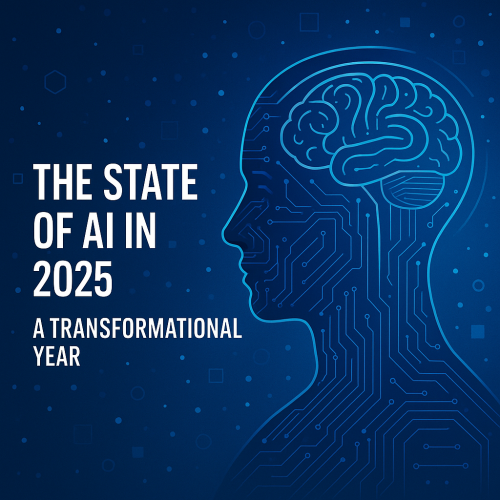
Artificial Intelligence in 2025 is no longer a futuristic concept—it’s a pervasive force reshaping industries, economies, and daily life. From the rise of autonomous AI agents to the decentralization of computing power, this year marks a pivotal shift in how we interact with and leverage intelligent systems.
1. The Rise of Autonomous AI Agents
AI has evolved from passive tools to proactive agents capable of complex decision-making and task execution. OpenAI’s Chief Product Officer, Kevin Weil, emphasized that 2025 is “the year of AI agents,” highlighting their transition from simple chatbots to sophisticated entities managing real-world tasks Axios. These agents are now integral in various sectors, from customer service to logistics, demonstrating adaptability and autonomy.
2. Decentralization: AI at the Edge
The paradigm is shifting from centralized data centers to edge computing. AMD’s CTO, Mark Papermaster, noted that AI inference is increasingly moving to devices like smartphones and laptops . This transition enables real-time processing, reduces latency, and enhances privacy, making AI more accessible and efficient for end-users.Business Insider
3. Education Reimagined with AI
AI is revolutionizing education by personalizing learning experiences and alleviating administrative burdens. Kira Learning, founded by Andrew Ng, employs AI agents to assist teachers with grading, lesson planning, and student performance analysis . This allows educators to focus more on mentorship and individualized instruction, enhancing educational outcomes.
4. Creative Industries Embrace AI
The creative sector is experiencing a renaissance powered by AI. Microsoft’s design chief, Jon Friedman, describes a shift where designers act more as editors, refining AI-generated content rather than creating from scratch . Similarly, the AI-generated film “What’s Next?” by Cao Yiwen challenges traditional filmmaking by using AI to produce entire scenes, sparking discussions about authorship and creativity .
5. Infrastructure and Energy Challenges
The rapid advancement of AI demands significant infrastructure and energy resources. Studies project that by 2030, AI supercomputers could require up to 9 gigawatts of power, equivalent to the output of nine nuclear reactors . This surge necessitates sustainable solutions and highlights the environmental impact of AI development.
6. Global Investment and Competition
AI investment is soaring, with the U.S. leading at $109.1 billion in private funding in 2024, nearly 12 times China’s $9.3 billion. This financial commitment underscores the strategic importance of AI in maintaining global competitiveness and driving innovation.
7. Regulatory Landscape and Ethical Considerations
As AI permeates various aspects of life, regulatory frameworks are evolving to address ethical concerns. California’s Governor Gavin Newsom cautioned against overly restrictive AI regulations that could hinder innovation, advocating for balanced policies that protect consumers without stifling technological progress.
8. The Era of Experience in AI
Google researchers David Silver and Richard Sutton propose that AI is entering the “Era of Experience,” where systems learn through real-world interactions rather than solely from human-generated data. This approach aims to overcome data limitations and drive the development of more adaptable and intelligent AI systems.
9. Workforce Transformation and Challenges
The integration of AI into the workforce is reshaping job markets, particularly affecting entry-level positions. A report highlights that AI’s ability to automate tasks is reducing opportunities for new graduates, prompting a need for upskilling and adaptation to remain competitive in the evolving job landscape.
10. Future Outlook
AI’s trajectory in 2025 indicates a future where intelligent systems are deeply embedded in our daily lives, driving efficiency, creativity, and innovation. However, this integration also brings challenges that require thoughtful consideration of ethical, environmental, and societal impacts. As we navigate this transformative era, collaboration between technologists, policymakers, and communities will be crucial in shaping an AI-driven future that benefits all.
Sources: The Verge, Business Insider, Stanford HAI, Politico, Polygon, Microsoft News, MIT Sloan Management Review, Morgan Stanley, Forbes, McKinsey, IEEE Spectrum.
